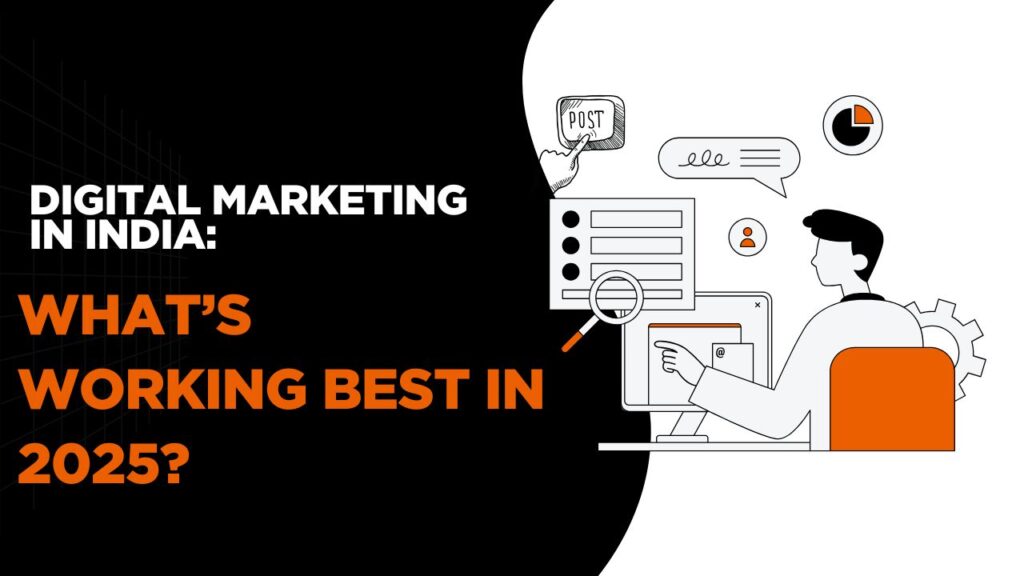In 2025, digital marketing in India continues to evolve rapidly, influenced by technological advancements, changing consumer behaviors, and the expanding digital ecosystem. With a growing internet user base and increased smartphone penetration, businesses are adapting their strategies to effectively engage with diverse audiences across the country.
Table of Contents
The Digital Marketing in India
India’s digital marketing world is characterized by a dynamic shift towards personalized, data-driven, and interactive content. The proliferation of affordable smartphones and high-speed internet has enabled consumers from various demographics to access digital platforms, leading to a surge in online activities such as shopping, content consumption, and social interaction.
Key Trends Shaping Digital Marketing in India
Artificial Intelligence and Automation
Artificial Intelligence (AI) and automation are playing a pivotal role in streamlining marketing processes. From chatbots providing instant customer support to AI-driven analytics offering insights into consumer behavior, these technologies enhance efficiency and personalization in marketing campaigns.
Voice Search Optimization
With the increasing use of voice assistants like Alexa and Google Assistant, optimizing content for voice search has become essential. Businesses are focusing on natural language processing and long-tail keywords to improve visibility in voice search results.
Video Marketing Dominance
Video content continues to dominate digital marketing strategies. Platforms like YouTube, Instagram Reels, and TikTok are popular among Indian audiences, prompting businesses to create engaging video content to capture attention and convey messages effectively.
Influencer Marketing Evolution
Influencer marketing is evolving with a focus on authenticity and niche audiences. Collaborating with micro and nano influencers allows brands to connect with specific communities, fostering trust and engagement.
Hyper-Personalization
Leveraging data analytics, businesses are delivering hyper-personalized experiences to consumers. Tailoring content, product recommendations, and offers based on individual preferences enhances customer satisfaction and loyalty.
Mobile-First Approach
Given the high mobile internet usage in India, adopting a mobile-first approach is crucial. Optimizing websites and content for mobile devices ensures seamless user experiences and wider reach.
Social Commerce Integration
Social media platforms are increasingly facilitating direct purchases, blending social interaction with e-commerce. Integrating shopping features within social apps allows businesses to tap into the growing trend of social commerce.
Data Privacy and Compliance
With heightened awareness of data privacy, businesses are prioritizing transparent data practices. Complying with regulations and building trust through ethical data handling is essential for sustainable digital marketing efforts.
Strategies for Effective Digital Marketing in India
Content Localization
Creating content in regional languages caters to diverse linguistic audiences, enhancing relatability and engagement. Localization extends beyond translation, encompassing cultural nuances and preferences.
Omnichannel Marketing
Implementing an omnichannel strategy ensures consistent messaging across various platforms, providing a cohesive brand experience. Integrating online and offline touchpoints enhances customer journeys.
Interactive Content
Incorporating interactive elements like quizzes, polls, and live sessions fosters active participation, increasing user engagement and time spent on platforms.
Performance Marketing
Focusing on measurable outcomes, performance marketing involves strategies like pay-per-click (PPC) advertising and affiliate marketing to drive specific actions and optimize ROI.
Email Marketing Revitalization
Personalized and targeted email campaigns remain effective in nurturing leads and maintaining customer relationships. Segmentation and automation enhance the relevance and efficiency of email marketing.
Challenges in Digital Marketing
Ad Fatigue
Overexposure to digital ads can lead to ad fatigue among consumers. Diversifying content formats and ensuring relevance helps mitigate this issue.
Algorithm Changes
Frequent updates to algorithms on platforms like Google and social media can impact content visibility. Staying informed and adaptable is key to maintaining reach.
Competition
The digital space is crowded, making it challenging to stand out. Differentiation through unique value propositions and creative content is essential.
Future Outlook
The future of digital marketing in India is poised for continued growth, driven by technological advancements and evolving consumer behaviors. Embracing innovation, personalization, and ethical practices will be instrumental in navigating the dynamic digital landscape.
Frequently Asked Questions (FAQs)
Q1: What is the significance of digital marketing in India in 2025?
Digital marketing in India in 2025 is crucial due to the country’s expanding digital user base and the shift towards online platforms for information, shopping, and entertainment.
Q2: How can businesses leverage voice search in their digital marketing strategies?
Businesses can optimize content for voice search by using natural language, focusing on long-tail keywords, and ensuring mobile-friendliness to improve visibility in voice search results.
Q3: Why is video marketing important in the current digital landscape?
Video marketing is important as it effectively captures attention, conveys messages succinctly, and is highly shareable, making it a powerful tool for engagement and brand awareness.
Q4: What role does personalization play in digital marketing?
Personalization enhances user experience by delivering relevant content and offers, leading to increased engagement, customer satisfaction, and conversion rates.
Q5: How can businesses address data privacy concerns in their marketing efforts?
Businesses can address data privacy concerns by implementing transparent data collection practices, complying with regulations, and communicating privacy policies clearly to build trust with consumers.



